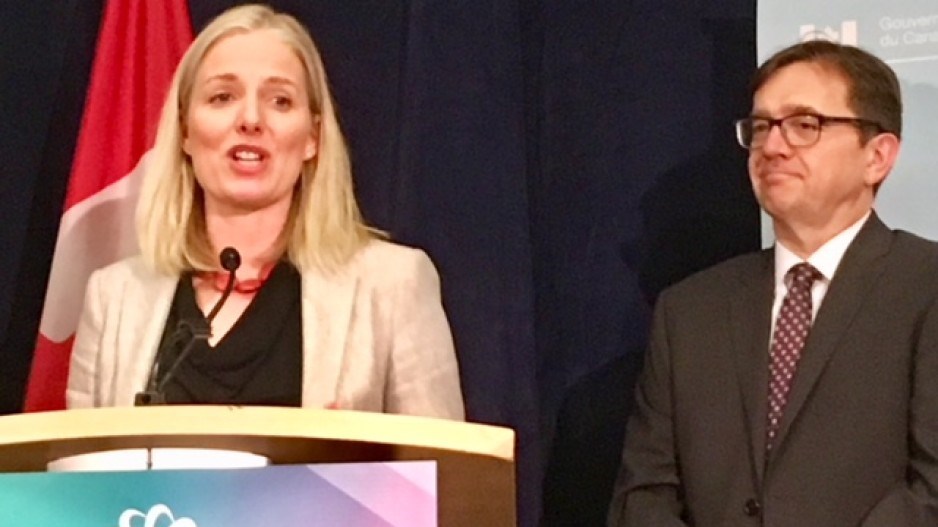With the threat of growing American protectionism looming over Canada, the importance of developing new markets and trade agreements outside of the U.S. and attracting more direct foreign investment were underscored Wednesday March 14 at the annual Globe conference.
Federal cabinet ministers used the annual sustainability conference to launch or announce new federal programs aimed at bolstering trade, investment and innovation, especially in the area of sustainable economic development.
While International Trade Minister Francois-Philippe Champagne officially kicked off the new Invest in Canada agency, Environment Minister Catherine McKenna announced a new $500 million program called the Low Carbon Economy Challenge, which will make federal funding available to businesses, municipalities, First Nations and provinces that have plans for businesses or innovations that reduce greenhouse gases.
Former Vancouver Economic Commission CEO Ian McKay will head the new Invest in Canada agency,
“Invest in Canada will attract large investments to Canada by promoting our country as top investment destination to the world,” Champagne said.
The federal government has also recently announce the creation of digital "super clusters" aimed at growing Canadian tech hubs like Vancouver.
The federal government's economic development strategies are aimed largely at developing high-tech and low-carbon industries in an attempt to diversify the economy, which is still heavily natural resource based.
“I think in the past decade, as our investment into Canada has slid, we've sort of been dining out or doing a victory lap about some of the extraordinary investments that happened a decade ago into our resource sector,” McKay said. "We need to diversify."
Champagne touched on some of the new trade agreements Canada has either signed with Europe or is working on with other nations, including the newly rebranded CPTPP (Comprehensive and Progressive Trans-Pacific Partnership). Those types of trade agreements open Canada to 2 billion new customers, Champagne said.
Despite Canada's efforts to expand trade with other countries other than the U.S., Canada has lately been sending some mixed signals to some of Canada's largest potential trading partners – China and India.
A bid by a Chinese company to acquire the Canadian construction company AECON Group Inc., for example, is being subjected to a thorough security review. And Prime Minister Justin Trudeau recently came away from China with little to show in the way of progress on free trade talks and, more recently, from India with some embarrassing diplomatic gaffs and not much else in the way of improved trade.
Champagne said talks with China on free trade are ongoing and that China understands that Canada has national security concerns that it needs to address whenever a foreign company with a government tie acquire a Canadian company like AECON. He said China continues to be interested investing in Canada, particularly in the clean-tech space.
“I can tell you, having done trade missions in China, that China in particular is very much interested in clean technologies,” Champagne said. “We think we can be partners in tackling some of the biggest challenges of the world around climate change.”
McKenna cited former Bank of Canada chief Mark Carney, now the UK's central bank head, who has estimated the investment opportunity that tackling climate change and moving to a lower carbon economy presents to be worth $30 trillion.
“We want Canadians to be at the forefront of that,” McKenna said, after sketching out the new $500 million Low Carbon Economy Challenge program.
“We also want innovation. We want innovation that is going to lead us to a cleaner future but is going to create good jobs here and also technologies and products that we can export abroad.”
As for traditional resource industries, Canada, at all levels of government, has telegraphed some very negative signals to the oil and gas sector in recent years, and Canada has seen some fairly alarming decisions by large oil and gas companies, some of which have divested their Alberta oil sands holdings, while others cancelled multi-billion liquefied natural gas projects in B.C.
The one fossil-fuel projected that both Champagne and McKenna reiterated support for is the $7.4 billion Trans Mountain pipeline expansion.
Asked how the new Low Carbon Economy Challenge, which is partly intended to reduce greenhouse gas emissions, fits with Ottawa's support of an oil pipeline expansion, McKenna said that her government is striking a balance: implementing strategies for fighting climate change while supporting an important part of the Canadian economy – Alberta oil.
“We would not have been able to get a national climate plan should we not have had the support of key provinces like Alberta,” McKenna said.
“The progressive NDP government in Alberta was the first government ever to do hard things,” she said, citing the Rachel Notley government's commitment to phase out coal power, place an emissions cap on oil sands production and introducing a carbon tax.
The new Low Carbon Challenge fund has two streams. One is $450 million for big business, cities and provincial governments. The second is $50 million earmarked specifically for First Nations, small business, smaller municipalities and non-profit organizations.
To qualify for funding, projects must foster “clean” economic growth and reduce GHGs.



